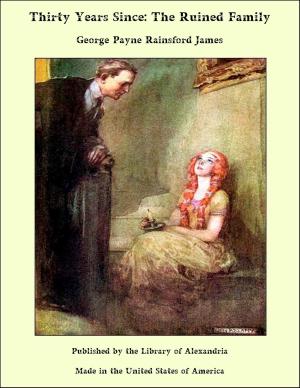Under the Ensign of the Rising Sun: A Story of the Russo-Japanese War
Nonfiction, Religion & Spirituality, New Age, History, Fiction & Literature| Author: | Harry Collingwood | ISBN: | 9781465537553 |
| Publisher: | Library of Alexandria | Publication: | March 8, 2015 |
| Imprint: | Language: | English |
| Author: | Harry Collingwood |
| ISBN: | 9781465537553 |
| Publisher: | Library of Alexandria |
| Publication: | March 8, 2015 |
| Imprint: | |
| Language: | English |
Dismissed the Service. “Well, good-bye, old chap; keep a stiff upper lip, and hope for the best; the truth is pretty sure to come out some day, somehow, and then they will be bound to reinstate you. And be sure you call on the Pater, and tell him the whole yarn. I’ll bet he will be able to give you some advice worth having. Also give my love to the Mater, and tell her that I’m looking forward to Christmas. Perhaps I may see you then. Good-bye again, and good luck to you.” The speaker was young Ronald Gordon, one of the midshipmen belonging to H.M.S. Terrible, and my particular chum; and the words were spoken as we parted company on the platform of Portland railway station, Gordon to return to his ship, while I, an outcast, was bound for London to seek my fortune. Yes; after doing splendidly at Dartmouth, heading the list at the passing-out exam, and so at once gaining the rating of midshipman; doing equally well afloat during the subsequent three years and a half, qualifying for Gunnery, Torpedo, and Navigating duties, serving for six months aboard a destroyer, and everywhere gaining the esteem and goodwill of my superiors, here was I, Paul Swinburne, at the age of seventeen and a half, an outcast kicked out of the Navy with ignominy and my career ruined, through the machinations of another, and he my cousin! He, Bob Carr,—like myself, a midshipman aboard the Terrible,—had committed a crime of a particularly mean and disgraceful character—there is no need for me to specify its precise nature—and with diabolical ingenuity, knowing that discovery was inevitable, had succeeded in diverting suspicion so strongly toward me that I had been accused, court martialled, and—although I had pleaded not guilty—found guilty and dismissed the Service
Dismissed the Service. “Well, good-bye, old chap; keep a stiff upper lip, and hope for the best; the truth is pretty sure to come out some day, somehow, and then they will be bound to reinstate you. And be sure you call on the Pater, and tell him the whole yarn. I’ll bet he will be able to give you some advice worth having. Also give my love to the Mater, and tell her that I’m looking forward to Christmas. Perhaps I may see you then. Good-bye again, and good luck to you.” The speaker was young Ronald Gordon, one of the midshipmen belonging to H.M.S. Terrible, and my particular chum; and the words were spoken as we parted company on the platform of Portland railway station, Gordon to return to his ship, while I, an outcast, was bound for London to seek my fortune. Yes; after doing splendidly at Dartmouth, heading the list at the passing-out exam, and so at once gaining the rating of midshipman; doing equally well afloat during the subsequent three years and a half, qualifying for Gunnery, Torpedo, and Navigating duties, serving for six months aboard a destroyer, and everywhere gaining the esteem and goodwill of my superiors, here was I, Paul Swinburne, at the age of seventeen and a half, an outcast kicked out of the Navy with ignominy and my career ruined, through the machinations of another, and he my cousin! He, Bob Carr,—like myself, a midshipman aboard the Terrible,—had committed a crime of a particularly mean and disgraceful character—there is no need for me to specify its precise nature—and with diabolical ingenuity, knowing that discovery was inevitable, had succeeded in diverting suspicion so strongly toward me that I had been accused, court martialled, and—although I had pleaded not guilty—found guilty and dismissed the Service















